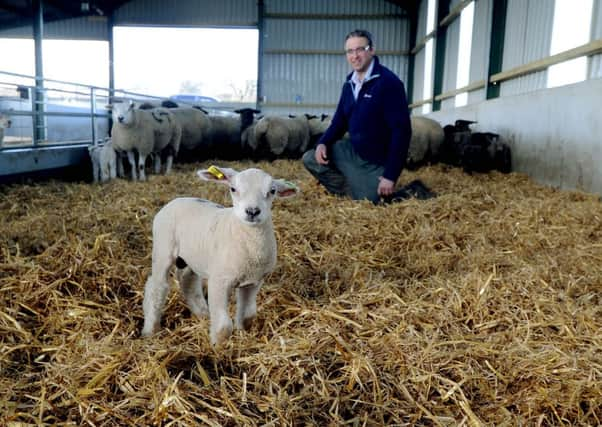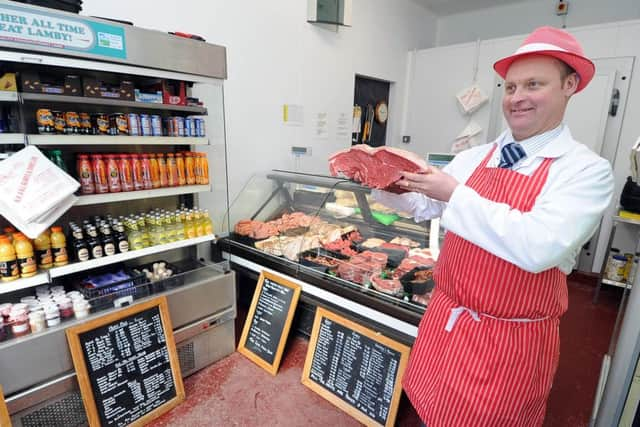Running the farm is a real family affair


It’s not an unfamiliar sight at this time of year but the number of them has shown a marked increase since he took the advice of his wife.
“Fiona works for a pig breeding company and made me more aware of performance recording,” he said. “We now buy performance-recorded tups and it is certainly making a difference. This year our early lambing ewes averaged 1.98 lambs when scanned. That’s way up on the 1.68 we used to get.”
Advertisement
Hide AdAdvertisement
Hide AdThe Glaves family is well known for their butcher’s shop, which is currently being extended, in the village of Brompton by Sawdon, eight miles from Scarborough. Anthony’s father Brian built up the trade over many years and is still very much involved with the family business today that sees Anthony and his brother James working together across the abattoir, shop and farm.


Anthony said: “Dad does the buying either from individual local farms or from the livestock markets; mum (Doreen) works in the office one day a week as she also looks after our son Charlie, five; James manages the abattoir and butcher’s shop and I manage the farm although we both get involved in whatever needs to be done. James’ wife Hazel also works in the office full time so it’s a real family effort.”
Around this time of year most of Anthony’s time is spent on the farming operation that runs to around 200 acres and includes a base in the village at North Lodge Farm with additional land and buildings elsewhere. The livestock includes sheep, pigs and cattle.
“We have pedigree and commercial flocks,” he said. “The pedigrees include 45 Suffolk ewes; 45 Texels; and 40 Southdowns. We have around 130 crossbred ewes and lamb in two batches – one starting around 4 January each year and the other in early March, we’re near the end of lambing now with just around 20 to go.
Advertisement
Hide AdAdvertisement
Hide Ad“It used to last right through from January to April but we’ve managed to condense it. Something like 80 per cent of the lambs go through the shop by the end of June with the rest kept for breeding either for our own replacements or to sell on to other breeders. We buy in rams but other than that it’s a pretty much closed flock.”
Showing sheep has become one of Anthony’s passions. Indeed, the very first year I started writing about farms and farming back in 1991 I recall seeing him at Sneaton & Hawsker Show where he picked up his first prize.
“That was the first show where I won,” he said. “I love competing at shows such as the Great Yorkshire, Driffield, Ryedale and Thornton le Dale but where I get the greatest buzz is at the pedigree shows and sales in livestock markets.
“It pushes me by going to these because you get an accurate reflection of how well you’re doing as people spend their money on what you have produced. My proudest moment so far has not been in winning a title but in coming second at Stirling last year. It was a major Suffolk sheep sale and the ram lamb made £1800. One of my goals is to win the show title.
Advertisement
Hide AdAdvertisement
Hide Ad“We had a good year at the Great Yorkshire last year with second and third places in the Texels, so we were knocking on the door, but with our Southdowns we’ve won the national show title four times in the past five years at Worcester. We started with them about 10 years ago with just six ewes and they lamb very well. They are extremely cost effective and we’re developing a good reputation as other breeders are now coming to buy from us.”
Anthony has continued to work with performance-recorded tups and is hoping that a recent Texel purchase will add even greater credence to his pedigree flock.
“We’ve just bought the biggest back-ended sheep recorded in the UK. We’re already at the stage where 75 per cent of our lamb tups are being sold privately and we’re keen to maintain that repeat business. That’s why we’ve bought what we hope is wisely.”
Berkshire pigs weren’t something that Anthony wanted to go into particularly but from a start-up of two sows eight years ago he now has eleven.
Advertisement
Hide AdAdvertisement
Hide Ad“Their inter-muscular fat helps with the flavour in our sausages and pies,” he said. “We buy 20 hybrid pigs a week for the butchery and put the meat from five of these traditional pigs amongst it and the mix produces something really special
The cattle are James’ line but are still part of the farming operation with a current herd number of 18 cows. They start calving now through until April.
“Over the years the type of beef we’ve always sold best in the shop has been native breeds,” Anthony said. “We have our own bull and also use AI on them. James hasn’t shown them before but I believe he’s planning on taking a heifer to the Great Yorkshire Show for the first time this year.”
Crops are also grown including around 60 acres of spring barley and 20 acres of winter wheat, plus 4 acres of fodder beet.
Advertisement
Hide AdAdvertisement
Hide Ad“The farm only produces about 25-30 per cent of the stock we need for the shop,” said Anthony. “In the abattoir we’re doing 25-30 lambs a week and 25 beasts a week so we buy a good deal of cattle and try to buy from local people wherever we can. In order to keep up with demand we store the cattle and sheep dad buys on our farmland until needed. We buy something like 50-60 lambs a week and bought 300 that we wintered ready for the shop.”
The Glaves’ reopened their new abattoir last year following a fire in the building that could have ruined them. Now they’re looking forward with confidence.
“We’re currently investing in the shop and extending our lines substantially,” said James.
“The new shop will also sell alcohol. Since the village has gone dry with the closure of the Cayley Arms it now means locals will have somewhere to buy their beer and wine to go with their steaks.”